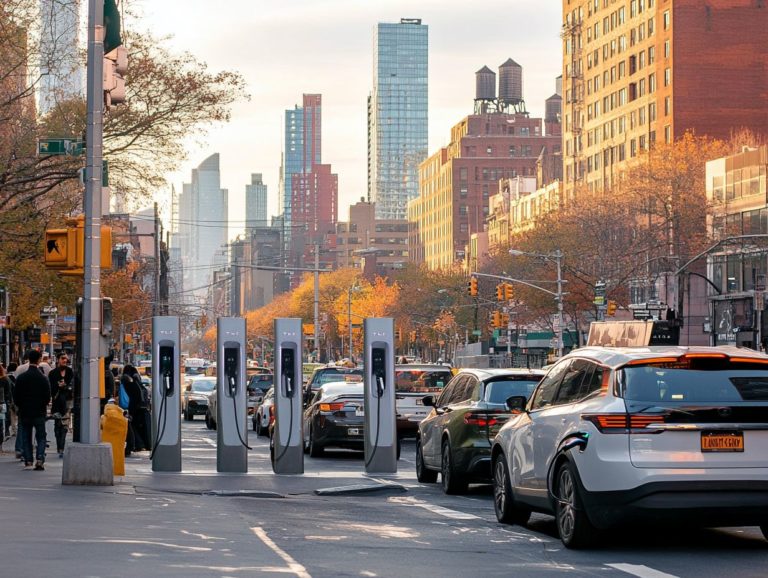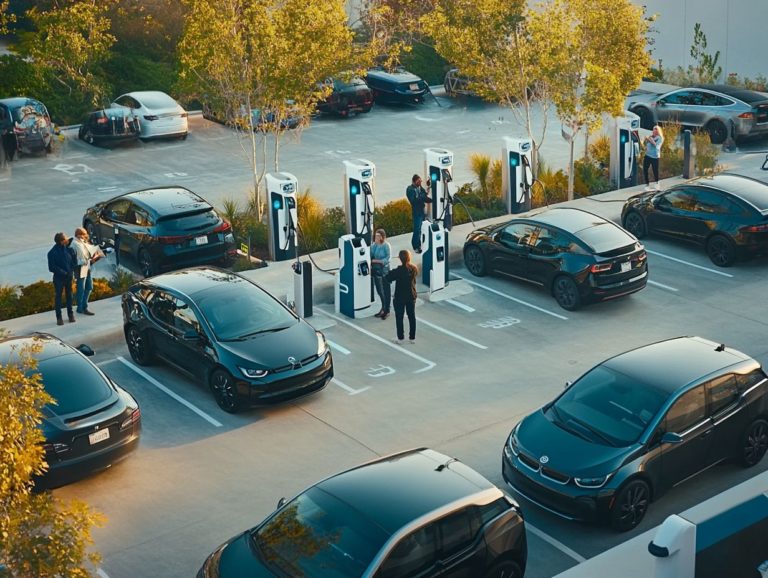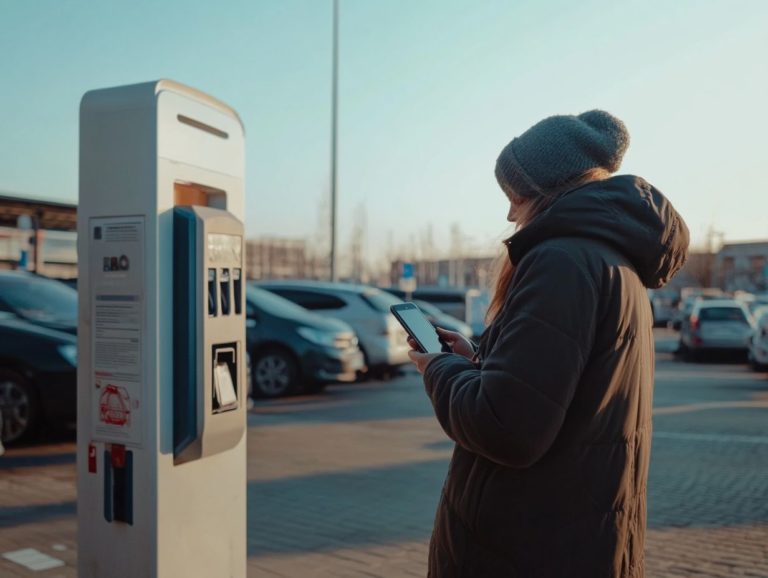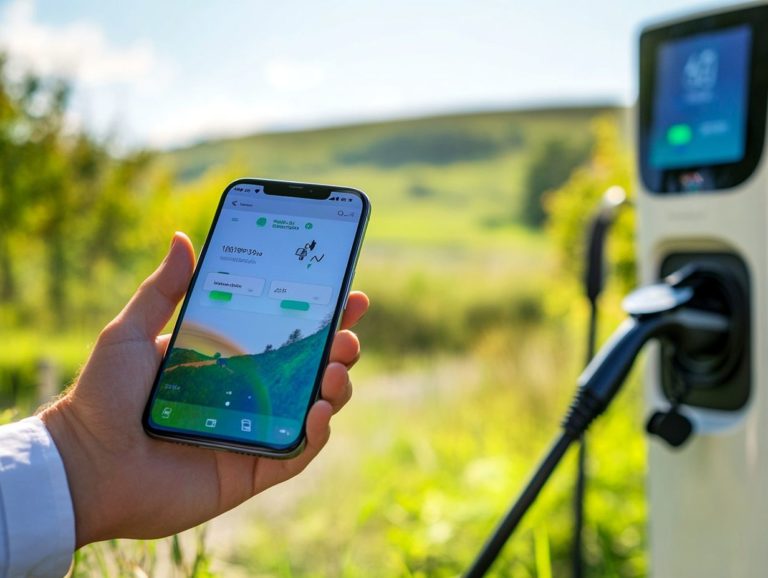5 Common Myths About EV Charging
As electric vehicles (EVs) become increasingly popular, misconceptions about their charging process also begin to circulate.
Many potential users find themselves discouraged by common myths that depict EV charging as inconvenient, expensive, and even unsafe. This article seeks to debunk five widespread myths surrounding EV charging while exploring various charging options available, along with their benefits and challenges.
By illuminating these misunderstandings, you can cultivate a more informed perspective on EV charging and its promising future.
Contents
- Key Takeaways:
- 1. EV Charging Is Expensive
- 2. EV Charging Is Not Convenient
- 3. EVs Have Limited Range
- 4. EV Charging Is Not Safe
- 5. EVs Are Not Environmentally Friendly
- What Are the Different Types of EV Charging?
- What Are the Challenges in Adopting EV Charging?
- What Are the Future Developments in EV Charging Technology?
- How Can Individuals and Businesses Benefit from EV Charging?
- Your EV Questions Answered!
Key Takeaways:
- EV charging is often more affordable than you think, with lower maintenance and fuel costs.
- Charging infrastructure is expanding, making EV charging more convenient.
- Modern EVs can travel over 200 miles on a full charge, suitable for daily commutes and long trips.
1. EV Charging Is Expensive
While electric vehicles (EVs) are marketed as a savvy choice for eco-conscious consumers, the reality of EV charging costs can pose a challenge to widespread adoption, especially compared to traditional gasoline vehicles.
Understanding the total cost of ownership is crucial. This includes charging expenses and maintenance benefits. Factors like changing energy demand and various pricing models can impact overall charging costs. While savings at the pump are appealing, concerns about running out of battery during travels must be addressed.
The initial purchase price of electric vehicles may be higher than conventional cars. However, long-term benefits often tip the scales in favor of EVs. Over time, significant savings in fuel costs and maintenance make the financial equation more favorable. Join the EV revolution today!
2. EV Charging Is Not Convenient
Convenience is frequently highlighted as a significant drawback of electric vehicle ownership, particularly regarding the accessibility and efficiency of charging infrastructure. You may worry about the availability of charging stations and the compatibility of various networks.
These concerns can deter you from becoming an EV owner, hindering broader adoption. Navigating a patchwork of charging stations, each with different levels of availability, can be frustrating.
Advancements in charging network apps simplify locating nearby stations, verifying their availability, and making payments. By increasing public charging stations, concerns surrounding range anxiety can be alleviated, creating a supportive environment for electric vehicle enthusiasts.
3. EVs Have Limited Range
Many people worry about running out of power on long trips, but there’s good news! One primary concern about electric vehicles is their limited range compared to traditional gasoline vehicles.
Modern gasoline vehicles typically offer ranges of 300 to 400 miles on a full tank. However, many new electric models boast ranges exceeding 250 to 370 miles on a single charge. Innovations in battery technology, such as high-density lithium-ion batteries, enhance performance and sustainability by recycling old batteries.
Smart charging systems allow you to charge during off-peak hours, making it easier to plan trips without the anxiety of running out of power. Such advancements help ease concerns that once hindered the widespread adoption of electric mobility.
4. EV Charging Is Not Safe
Safety concerns about charging electric vehicles might make you hesitant, raising questions about the integrity of EV batteries and whether safety standards are being met. Addressing these concerns builds confidence in public charging infrastructure and enhances your EV ownership experience.
As technology advances, you’ll find reassurance in new battery safety protocols and stringent testing regulations designed for EV owners. Improved guidelines for installation reduce risks like overheating or electrical faults, boosting your trust in the ecosystem.
The maintenance benefits of electric vehicles—fewer moving parts and less dependence on traditional fuel systems—also contribute to their longevity. These innovations foster greater acceptance of EVs, presenting them as safer and more reliable options in the ever-changing automotive landscape.
5. EVs Are Not Environmentally Friendly
Despite claims of being environmentally friendly, misconceptions about the true carbon footprint of electric vehicles persist—especially regarding the entire lifecycle of batteries used in EVs and battery recycling complexities.
The production of EVs requires significant resources, particularly in mining raw materials for batteries, which can lead to environmental degradation if not managed responsibly. However, harnessing renewable energy during a vehicle’s operation can significantly reduce its carbon footprint.
Evaluating these factors helps you understand how EVs impact the environment compared to traditional gasoline vehicles.
What Are the Different Types of EV Charging?
Understanding the various types of EV charging is essential for navigating the charging process and enhancing your electric vehicle experience. From home charging to public stations, each option presents different charging speeds and compatibility levels.
Level 1 charging utilizes a standard household outlet. While accessible, it requires longer wait times due to slower charging speeds. Level 2 chargers provide a more robust charge, significantly reducing wait times, making them ideal for homes and public spaces.
If speed is what you seek, DC fast charging shines, allowing quick top-ups during longer journeys. However, availability may be inconsistent, and compatibility can vary among different EV models.
Each charging type plays a crucial role in shaping your ownership experience, influencing how quickly you can get back on the road while considering the infrastructure options in your area.
What Are the Benefits of EV Charging?
The benefits of EV charging extend beyond powering your vehicle; they include cost savings through tax breaks and reduced maintenance. By utilizing renewable power sources, you elevate your eco-friendly transportation choices while enjoying the convenience of charging network apps.
Smart energy management optimizes your charging costs, allowing you to shift usage to off-peak hours when rates are lower. This strategy leads to significant savings and eases stress on the grid during peak demand.
Tax incentives motivate more consumers to embrace renewable energy. Transitioning to renewable energy for EV charging helps reduce greenhouse gas emissions while fostering a robust economic landscape through clean energy innovations and job creation.
How Can EV Charging Infrastructure Be Improved?
Improving EV charging infrastructure is crucial for the widespread adoption of electric vehicles. This requires an upgrade of the power grid that integrates renewable energy sources and enhances public charging accessibility.
However, the current EV charging landscape presents significant hurdles. You may notice a lack of charging stations in cities and along major highways, which can discourage switching to electric vehicles.
By strategically increasing the number of public charging stations and investing in advanced grid technologies, communities can create a seamless charging experience. Integrating vehicle-to-grid systems offers a promising path forward, allowing your electric vehicle to draw energy when necessary and return excess energy back to the grid.
What Are the Challenges in Adopting EV Charging?
The transition to electric vehicles and their charging solutions comes with challenges, such as charging anxiety and costs that may deter you from making the leap. Concerns about compatibility and range anxiety shape perceptions and decisions regarding EV adoption.
These apprehensions can act as barriers, leaving many potential buyers feeling overwhelmed and uncertain about switching to EVs. Cultivating a culture of education and awareness around electric vehicles is essential to alleviate these concerns.
Engage with informative workshops, explore online resources, and attend community events designed to demystify the charging process and showcase the long-term savings associated with EV ownership. Clear information and valuable resources empower you to embrace sustainable transportation.
What Are the Future Developments in EV Charging Technology?
Future developments in EV charging technology are set to enhance your experience, improving speed and efficiency. Integrating smart charging technology with the electric grid will optimize energy usage and bolster the growth of renewable energy.
As these advancements emerge, expect significantly reduced charging times and an improved overall experience. Smart charging systems will enable you to manage energy consumption effectively, utilizing algorithms that sync with the grid’s demands and the availability of solar or wind power.
These advancements will benefit all EV owners and contribute to a more sustainable energy ecosystem, driving the electric vehicle market to new heights. This synergy between charging technology and sustainability efforts is essential for reducing carbon footprints and nurturing a cleaner environment.
How Can Individuals and Businesses Benefit from EV Charging?
Embracing EV charging offers numerous benefits, whether you’re an individual or a business. There are financial incentives like tax breaks, maintenance advantages, and smart energy management capabilities at your fingertips.
By adopting electric vehicles, you contribute to sustainable mobility and enjoy the conveniences of modern charging network apps.
Owning an electric vehicle translates to substantial long-term cost savings, especially in fuel and operational expenses. The environmental benefits are compelling as well; transitioning to electric vehicles reduces greenhouse gas emissions and promotes cleaner air quality.
Charging network apps enhance the EV ownership experience, providing real-time updates about available stations, optimizing travel routes, and helping you find the most affordable options. These benefits encourage more people and businesses to adopt electric mobility.
Your EV Questions Answered!
What are the common myths about EV charging?
1. Myth: Charging an EV will make my electricity bill skyrocket.
Reality: Charging an EV is often cheaper than fueling a gasoline car, especially in the long run.
Is it true that EV charging takes too long?
2. Myth: Charging an EV takes forever.
Reality: Modern EVs can reach 80% charge in under 30 minutes with a fast charger. You can even charge overnight at home while you sleep!
Are EVs only suitable for short distances?
3. Myth: EVs can only go short distances.
Reality: Newer EV models can travel over 250 miles on a full charge, which is perfect for most daily commutes.
Do EVs have a negative impact on the environment?
4. Myth: EVs harm the environment.
Reality: EVs produce zero emissions, making them a cleaner choice compared to traditional vehicles. They significantly reduce air pollution and greenhouse gas emissions.
Do I need to install a special charging station at home?
5. Myth: I must install a special charging station at home.
Reality: You can charge your EV using a regular household outlet, though it might take longer. A home charging station is just for convenience.
Are public charging stations hard to find?
6. Myth: It’s tough to find public charging stations.
Reality: The number of charging stations is growing fast. GPS and EV apps make finding one easy.

.jpg_00.jpeg)
.jpg_01.jpeg)
.jpg_10.jpeg)
.jpg_11.jpeg)



